The concept of Geothermal Energy as a natural source from the earth.How Does Geothermal Energy Work?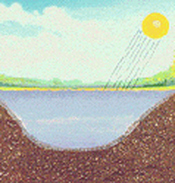
The science behind geothermal heat pump systems can be fairly easy to understand. All you need to know are a few basic concepts:
Energy efficiency Energy efficiency is calculated as the "useful work" or "energy delivered" divided by the amount of energy supplied to do that work. Energy efficiency for heat pump is measured in two different ways. Heating efficiency is expressed as a Coefficient of Performance (COP). The more efficient the system, the higher the COP, For example, a residential geothermal system might have a COP of 3.4 or higher. This means for every one unit of energy used to power the system, more than three units are put back into the home as heat. This compares to efficiencies of 0.92 for a high-efficiency natural gas furnace. Cooling efficiency is measured as an Energy Efficiency Ratio (EER). The higher the EER, the more efficient the system is. Keep in mind that both COP and EER are dependent on many factors, and that high-efficiency equipment comes with a higher price tag, however the energy savings can pay back the difference in just a few years. Ground
temperatures
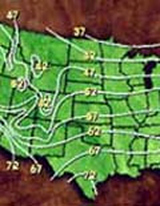
At depths below six feet, ground temperature stays a constant 50 to 55 degrees Fahrenheit throughout the year.
During the winter, a geothermal system absorbs this extra heat from the ground and transfers it into your home. During the warmer months, the system takes heat from indoors and moves it back underground. Air temperature, moisture content, soil type and vegetation (i.e., trees and plants) all have an effect on underground soil temperature. Soil
and rock
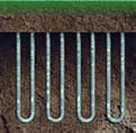
No single factor is more important to the successful operation of a ground-coupled heat pump system than the efficiency of the heat transfer between the loops and the surrounding soil.
Soil properties and the thermal performance of rocks vary widely. These variations indicate the importance of an accurate estimate before any geothermal loop design can be finalized. Your contractor might consult a helpful source like the Natural Resources Conservation Service Soil Survey. This is available from local NRCS offices located in approximately 3,000 counties across the United States. It gives a detailed layer-by-layer description of the soil down to a five- or six-foot depth, along with any rock content, density, soil types and available water capacity. Loop
fluids
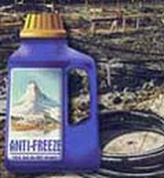
A good heat transfer fluid is vital
to the operation of a geothermal heat pump.
In most areas, geothermal contractors use a corrosion-inhibited antifreeze solution with a freeze point of 10 degrees or more below the minimum expected temperature. The antifreeze solutions used are biodegradable, non-toxic, non-corrosive and have properties that will minimize pumping power needed.
Air
distribution
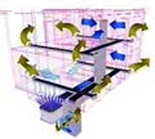
The air distribution system can make
a big difference in both the cost and the effectiveness of geothermal heating
and cooling. It also has an important effect on personal comfort and health.
The air handling component is either a separate cabinet or is part of the cabinet that houses the geothermal heat pump, and includes the blower assembly that forces air through the ductwork. The supply ductwork carries air from the air handles to the rooms. Typically, each room has at least one supply duct and larger rooms may have several. The return ductwork moves air from the room back to the air handler. Most buildings have one or more main return ducts located in a central area. Need more information on Geothermal… Geothermal is a natural way to tap into the earth’s natural energy to efficiently and economically heat and cool your home. For more information on geothermal heating and cooling contact the experienced geothermal experts at K. Kelly at 920-469-3500 to get all your geothermal questions answered. Back to geothermal |
|